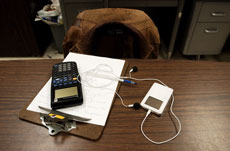Police promote property safety

Online Poster
Nov 18, 2004
Last updated on May 11, 2016 at 05:20 p.m.
For Nick Yates, senior in engineering, last year’s holiday vacation ended horribly when he arrived on campus to find his favorite possessions stolen.
Yates, who lost a set of golf clubs, a home theater system and a refrigerator from his residence at the Phi Delta Theta fraternity house, said the police were helpful but unfortunately could not recover his stolen property.
Yates is not alone in this situation – burglary is one of the most common crimes on campus. However, University police officers say students can protect themselves from “opportunity crimes” – the most common type of theft on campus – by being aware of their personal possessions at all times and remembering to lock their doors.
“I don’t want to lose stuff ever again,” Yates said. “I’m very careful about locking my door. I double check it every time I leave.”
Get The Daily Illini in your inbox!
An opportunity crime, according to the University police, is a crime that occurs when the opportunity presents itself.
“People leave things unattended,” said Sergeant Joan Fiesta. “Be vigilant over your items; take things with you.”
Opportunity crimes occur heavily in four campus areas: the Illini Union, the Intramural Physical Education Building (IMPE), residence halls and campus libraries, said Tony Ortiz, crime prevention coordinator for University police. He also said most thefts occur during the day.
Commonly stolen items are things people can get quick cash from, Ortiz said. Such items include wallets, purses, credit cards, computers and cell phones.
Students are encouraged to alert police if they see anyone acting suspiciously.
“It’s a behavior analysis. If it looks like they don’t have a purpose within the facility, contact security,” Fiesta said. “It’s important that we get there quickly and assess the situation.”
According to Ortiz, students should try to get a good description of the person and what the crime was, if any. Use emergency phones, campus phones, cell phones or travel to a nearby building to contact police.
Ortiz recalled a situation where a Florida Avenue resident was looking out of his window and noticed a man peering into cars across the street. The student alerted authorities, allowing them to catch a criminal officers had been searching for.
Police advise students to write down the serial numbers located on electronic items. If stolen, Fiesta said police could enter the serial numbers into a computer database called LEADS that would allow them to track the items.
Students are not the only ones at risk. Ortiz said University faculty members should lock their offices when they leave and be overly cautious while using laboratories.
“I could go into any science building and come out with 12 to 13 book bags,” Ortiz said.
Car stereos and speakers are also high risk.
“If you have something of value don’t keep it in plain sight,” Ortiz said. “Cars are broken into because people see something of value.”
To report a crime, students, faculty and staff can also call Crimestoppers at 333-TISS (8477) and can be eligible for a reward of up to $1,000 if their call leads to a conviction.
“Everyone plays a part preventing crime on campus – everyone,” Ortiz said. “Don’t be afraid to call police, some calls lead us to capture criminals.”





